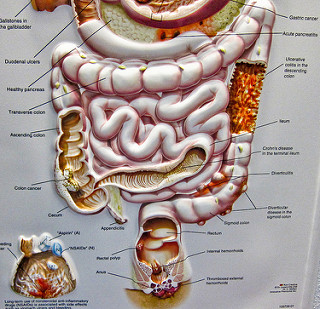People can learn to like healthy foods, brain scans suggest
The study team, including researchers from Harvard Medical School and Tufts University, both in Boston, MA, reports the findings in the journal Nutrition & Diabetes.
Senior author Susan B. Roberts, who among other posts holds a professorship at Tufts' Friedman School of Nutrition Science and Policy, says:
"We don't start out in life loving French fries and hating, for example, whole wheat pasta. This conditioning happens over time in response to eating - repeatedly! - what is out there in the toxic food environment."
Something scientists are uncertain about is when people become addicted to unhealthy foods, does this mean the brain circuits that reinforce the addiction are fixed for good, or can they be reversed? If they are fixed then people trying hard to lose excess weight face a lifetime of battling temptation and ignoring food cravings.
Study suggests the brain is 'plastic' and addiction to unhealthy food can be reversed
Comparing the scans taken before and after the program, the team saw a significant shift in reward center activity away from high-calorie toward low-calorie foods in the group that followed the program.
But this study - although small and still to be confirmed by longer-term research with much larger groups - offers hope. It suggests that the brain is "plastic" when it comes to food addiction: the circuits can be reversed with training.
Prof. Roberts and colleagues studied the reward systems in the brains of 13 overweight and obese men and women. Eight of the volunteers were enrolled in a new 6-month weight-loss program designed by Tufts University, and the other five were not - they were the control group.
All participants had brain scans at the beginning and end of the program. From the functional magnetic resonance imaging (fMRI) scans, which were conducted as the participants were shown images of high- and low-calorie foods, the researchers could observe activity in the reward centers in the brain, which are associated with learning and addiction.
By the end of the 6-month program, compared to controls (who on average gained over 2 kg), the program followers achieved significant weight loss (on average they lost over 6 kg).
The scan results showed that compared to the controls, the group that followed the weight-loss program showed increased reward center activity in response to seeing images of low-calorie foods at the end of the program, and decreased activity in response to high-calorie foods.
(Strictly speaking, the term "low-calorie" is a shorthand for the types of food recommended by the weight-loss program and "high-calorie" is shorthand for the types of food the program discourages.)
And when the team compared the scans taken before and after the program, they saw a significant shift in reward center activity away from high-calorie toward low-calorie foods in the group that followed the program.
These changes suggest the participants were experiencing more reward and enjoyment of healthier food cues at the end of the program than they were at the start.
Reversing addiction to unhealthy food plus increasing liking for healthy food is the key
The weight-loss program is designed to change how people react to different foods. The team suggests it is the combination of reversing addiction to unhealthy food and increasing the liking for healthy food that is important for sustained weight loss. As first author Dr. Thilo Deckersbach, a psychologist at Massachusetts General Hospital in Boston, explains:
"Although other studies have shown that surgical procedures like gastric bypass surgery can decrease how much people enjoy food generally, this is not very satisfactory because it takes away food enjoyment generally rather than making healthier foods more appealing."
"We show here that it is possible to shift preferences from unhealthy food to healthy food without surgery, and that MRI is an important technique for exploring the brain's role in food cues," he adds.
The team believes this is the first study to show the shift in food preferences in this way.
Speculating on which aspects of the weight-loss program were important, they say it was probably the combination of learning how to change behavior and the high-fiber, low glycemic menu plans that the participants followed.
Prof. Roberts points out there is still a lot more research needed to confirm these findings, including studies involving more participants, with long-term follow-up, and also looking at other areas of the brain.
"But we are very encouraged that the weight-loss program appears to change what foods are tempting to people," she adds.
Funds for the study came from the US Department of Agriculture and the Jean Mayer USDA Human Nutrition Research Center on Aging at Tufts University.
Prof. Roberts has a financial stake in iDiet, an online weight-loss program similar to the one used in the study.
In April 2014, in the first study of its kind, scientists reported how they used MRI to identify brown fat in a living adult. Writing in The Journal of Clinical Endocrinology and Metabolism, they explained how the findings could lead to new treatments for obesity and diabetes.
Written by Catharine Paddock PhD-
Bodybuilding Diet and Exercise: The Principles of Building the Perfect Body
Who can forget the physique of Arnold Schwarzenegger in the movie P
-
How To Get Taller In The Shortest Period Of Time!
If you are looking for information on how to get taller, you have come
-
Weight Loss Dos and Donts
People eyeing weight loss are caught in the never-ending fix about the
-
Does The Time Of Day You Eat Really Affect Your Weight?
We’ve all been tol
-
3 Lessons From The Biggest Loser
All over the world, night after night, millions of people are riveted
-
Hoodia Gordonii Weight Loss Enhancer
For every diet pill craze there are millions of disappointed users who
- DON'T MISS
- Dance to Lose Weight: Six Fun, Effective Styles
- How To Exercise: Choosing the right type of exercise for you
- Is Your Goal Really Weight Loss
- Effects Of Global Warming On Agriculture
- If You Make One Diet Change Today, This Is It
- Are Frozen Diet Foods Really Healthy?
- Lose Weight With these 5 Steps
- The Secrets To The Fat Burning Furnace Diet Program
- Lose Weight Permanently with the Power Pause
- Arm Liposuction For Slender Arms




